Authored by Natalie Winters via Substack,
When President Trump imposed sweeping tariffs on Chinese goods, the Chinese Communist Party didn’t just retaliate with trade measures. It launched an information war, using American insiders to spread its narrative that tariffs were reckless and self-defeating.
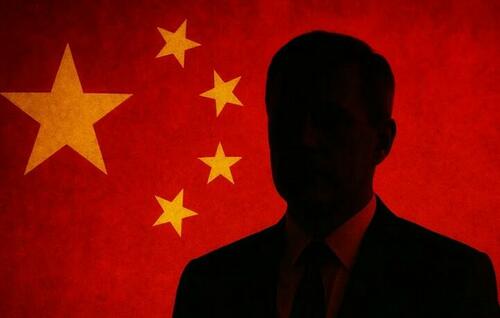
One of the most prominent voices in that campaign is Rick Waters, a former senior U.S. diplomat who once directed the State Department’s China House.
Since leaving government, Waters has become a reliable messenger for Beijing’s preferred positions, appearing with CCP-linked influence groups and using Western media outlets to promote pro-China talking points that undermine Trump’s trade strategy.
From State Department Insider to Beijing’s Trusted Voice
In late 2024, Waters participated in an official interview for China–US Focus, a platform run by the China–United States Exchange Foundation (CUSEF). In the interview, he called for “restraint” and “dialogue,” insisting that “both sides must avoid confrontation.” The phrasing matched Beijing’s diplomatic line word for word.
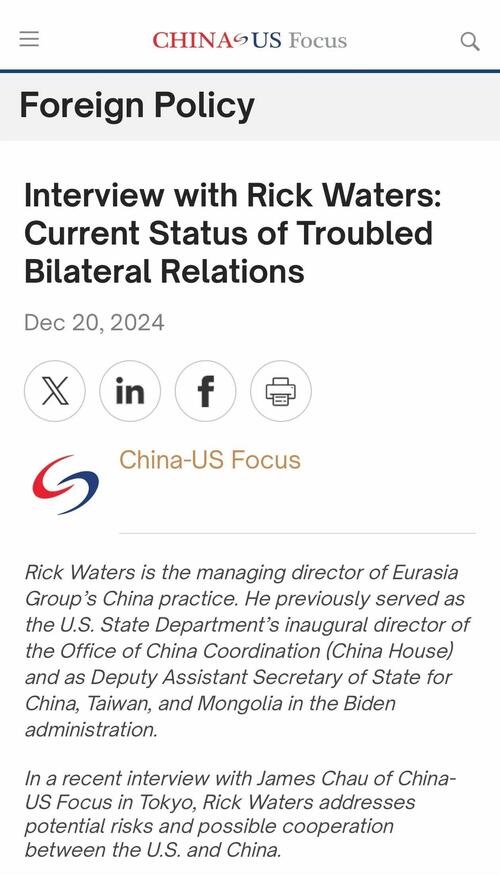
Shortly afterward, he appeared as a featured participant at the 2024 U.S.–China Hong Kong Forum, another CUSEF-organized event that gathered Chinese Communist Party officials, Hong Kong elites, and select Western figures for “private dialogue.” The agenda promised to explore “mutual respect” and “pathways to cooperation,” but the guest list told a different story.
CUSEF was founded by Tung Chee-hwa, a vice chairman of the Chinese People’s Political Consultative Conference, the advisory body that sits under the CCP’s United Front Work Department. The United Front is the arm of the Party responsible for foreign influence operations and elite recruitment.
The United Front: Beijing’s Hidden Ministry of Influence
Behind the polished language of “dialogue” and “mutual understanding” lies one of the CCP’s most dangerous tools of foreign interference: the United Front Work Department.
According to U.S. and allied intelligence reports, the UFWD operates as the Party’s “hidden ministry of influence.” It is tasked with guiding foreign elites, shaping overseas media narratives, and blurring the line between diplomacy, propaganda, and espionage.
The U.S.–China Economic and Security Review Commission calls it “the primary entity coordinating influence operations targeting foreign elites, media, and business leaders.”
Beijing’s own statements describe the department’s mission even more plainly: to “unite all possible forces” in service of China’s goals. In practice, that means cultivating Western politicians, academics, and journalists who can quietly normalize the CCP’s worldview inside democratic systems.
CUSEF: The Tip of the Spear
CUSEF serves as the frontline export of the United Front’s operations in the United States.
Founded in Hong Kong but deeply embedded in American institutions, it sponsors delegations of journalists, funds think tank partnerships, and organizes private roundtables with U.S. officials—all designed to project the image of “constructive engagement” while advancing Beijing’s interests.
A Senate investigation previously flagged CUSEF’s activities as a national security concern, citing its repeated attempts to “influence media narratives” and secure “favorable coverage” of China. Intelligence analysts describe it as “the tip of the spear” of Beijing’s foreign influence strategy—its charm offensive with a strategic purpose.
CUSEF’s Shadow Diplomacy and the National Security Risk
Waters’ participation in the Hong Kong forum raises serious counterintelligence questions. The event included private, unrecorded sessions between American participants and Chinese officials, giving Beijing a rare opportunity to map out U.S. policy networks, gauge internal divisions, and test new narratives through friendly interlocutors.
Even if Waters’ expenses or speaking fees were covered under “academic” pretenses, the optics are troubling. For a former diplomat with direct insight into Taiwan, trade, and intelligence coordination to accept travel or benefits from a foreign principal linked to an adversary state is a glaring breach of judgment.
Rooting for China in the American Press
After his involvement with CUSEF, Waters began amplifying Beijing’s messaging through major Western media outlets.
In an April 2025 feature for the Carnegie Endowment, he dismissed Trump’s tariffs as “unsustainable” and claimed Washington was “overestimating its leverage” while Beijing would “hold firm.” He painted China as disciplined and strategic, while portraying the United States as impulsive and politically motivated.
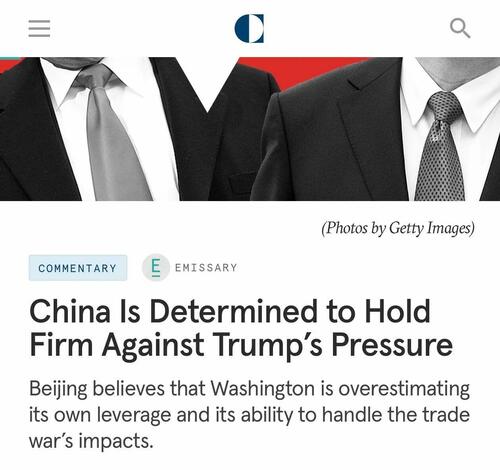
Around the same time, in an interview with the South China Morning Post, Waters declared that “anti-China sentiment in Washington does not equal consensus,” suggesting that Trump’s policies were extreme and unrepresentative of mainstream opinion. He emphasized “civil diplomacy” and “restraint,” phrases that echoed Beijing’s preferred messaging verbatim.
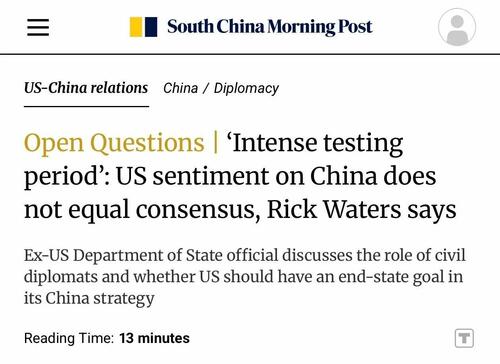
In NBC News, Waters repeated the claim that Trump’s tariffs were “backfiring” and “hurting U.S. consumers.” His framing, once again, aligned perfectly with the CCP’s argument that Washington’s pressure campaign was damaging its own economy.
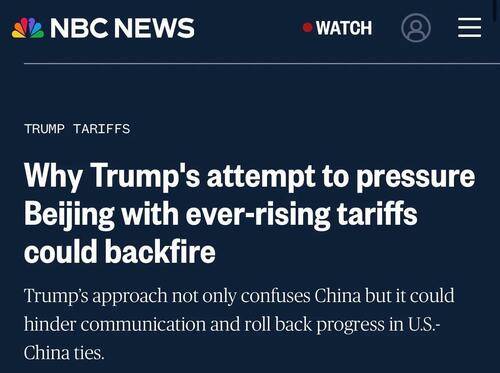
Each appearance cast China as the rational actor and Trump’s America as the aggressor. Waters was not analyzing U.S. policy; he was defending Beijing’s narrative.
Beijing’s Propaganda Echo Chamber
Chinese state media quickly took note.
The China News Service, an outlet overseen by the United Front Work Department, amplified Waters’ remarks and quoted him directly, highlighting his claim that “the tariff war is not about winning.” His words were used to validate Beijing’s portrayal of the United States as disorganized and self-defeating.
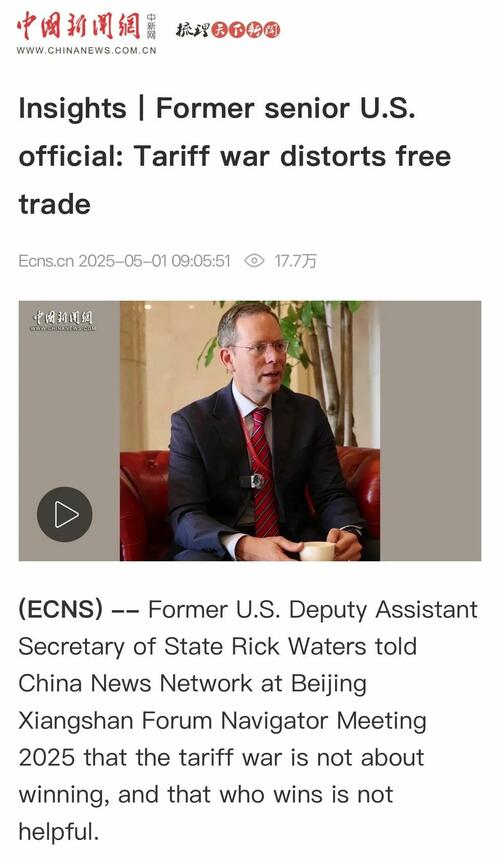
The Real Trade War Was Always About Influence
Rick Waters’ trajectory—from Biden’s China House to CUSEF panels to favorable coverage in Chinese state outlets—reveals how Beijing uses credibility, flattery, and access to infiltrate America’s information ecosystem.
Trump’s tariffs targeted China’s economy. Beijing’s response targeted America’s elite class.
And in that quiet war for narrative control, the CCP didn’t need spies in the traditional sense. It needed insiders willing to speak its language.
Loading recommendations…
#Biden #Official #Worked #Chinese #Influence #Group #Undermine #U.S #Tariff #Negotiations
